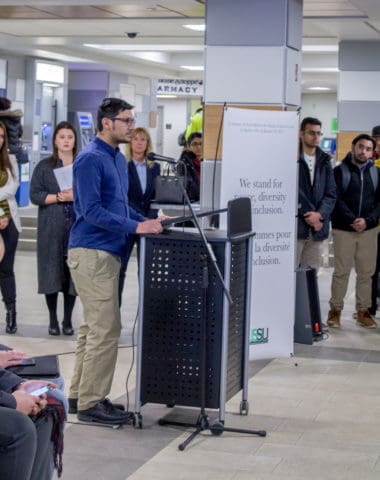In the wake of the recent tragedy in Quebec City and the seemingly never-ending torrent of hatred spewing from the leaders of our neighbors below, it can be hard for many to relate.
On Jan. 27, Donald Trump issued an executive order to temporarily block entry into the United States by citizens of seven majority-Muslim countries. This is clearly a misguided and ignorant attempt to “protect and preserve” American safety, disregarding the implications towards many innocent and already oppressed lives.

We can all show strength in trying times: a vigil hosted by the USSU in response to the Quebec City attacks is pictured above.
Despite the federal court judge ruling against the order, pausing the enforcement and its continuation indefinitely beginning Feb. 3, many from these barred countries are struggling with cancelled visas and the loss of refugee status. Potentially meaning another grueling bureaucratic process while their safety is at risk in their home country.
On Jan. 29, a shooting at a mosque in Quebec City left six men dead. They were parents, civil servants and academics who had left their countries of origin seeking better lives in Quebec.
In the week following these two significant and blatantly Islamophobic events, hate crimes towards Muslim groups and individuals were reported to rise across the globe.
How are these events blatantly Islamophobic? What evidence connects these events? After all, they happened in different countries. Haven’t we seen a similar ban on travel from majority-Muslim countries in the past? What on earth can we in Saskatchewan do to stop anything?
These are all questions you might have, but before you ask them — take a good hard look at yourself. Are you in a position of privilege? Have people with whom you share similar cultural or religious alignments been oppressed and discriminated against for generations?
Have you genuinely feared for your safety in the country or city you call home or grieved over the loss of someone who was attacked only for their faith? Are you sure you understand Islam and the difference between Islam and terrorist organizations?
Remember, from ignorance grows hatred and hatred — as we’ve seen — can cost the lives, comfort and safety of people.
Maybe you know all this and feel compassion for those impacted while you remain in relative comfort, away from these horrible news stories. It is still your job to play a part in this struggle for global well-being and tolerance. Here, however, is the thing: silence supports injustices. Your voice is worth more than you think.
A good start can be as simple as educating yourself on the complexities of issues using meaningful and credited sources before joining discussion on the topic. Moving forward, consider offering support to the Muslim community around you. Despite differences, there is always common ground in humanity.
Whatever you do, don’t contribute to hate speech, intolerant behavior or negative conversations. Throwing around words you don’t understand, using racial slurs or discriminating against a group of people without reason contributes wildly to the increase of violent acts we continue to bear witness to. No one is perfect and learning is a lifelong process, but be open to new ideas and try to put yourself in other people’s shoes.
The best way to learn is from other people. At the University of Saskatchewan, the Muslim Students’ Association hosts events aimed to promote understanding. Recently, they organized United Islam Awareness Week, which ran from Jan 23. to Jan. 27 and included lectures, film screenings, informational displays and literature.
Following the attack in Quebec City, the U of S Students’ Union also hosted a vigil and hoisted a banner expressing condolences and support for the Muslim community, which students could sign and include their own words of sympathy.
It’s important to remember that while the world may be bleak, through education and engaging with others we can contribute to something better moving forward.
—
Emily Migchels
Photo: Jeremy Britz / Photo Editor